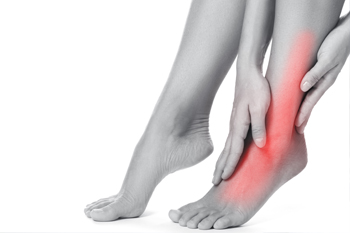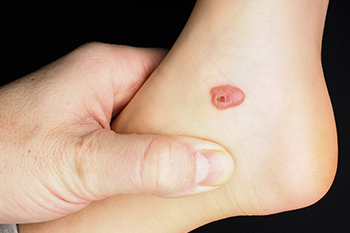1648 US Highway 130
North Brunswick, NJ 08902

Foot pain, a pervasive issue affecting individuals of all ages, warrants a comprehensive understanding to address its diverse origins and alleviate discomfort. Defined as discomfort or soreness experienced anywhere in the foot, foot pain can stem from a multitude of factors. Common causes include biomechanical issues such as flat feet, high arches, or abnormal gait patterns, which place undue stress on the feet. Additionally, injuries like sprains, strains, or fractures, whether from sports activities or accidents, contribute to foot pain. Footwear choices play a significant role, with ill-fitting shoes, high heels, or worn-out footwear exacerbating discomfort. Furthermore, medical conditions such as arthritis, plantar fasciitis, neuropathy, and tendonitis can manifest as persistent foot pain. Lifestyle factors like obesity, poor posture, and occupational demands also impact foot health. If you are experiencing any type of foot pain, it is strongly suggested that you seek the guidance of a podiatrist who can accurately diagnose and offer a treatment plan that is right for you.
Foot Pain
Foot pain can be extremely painful and debilitating. If you have a foot pain, consult with Dr. Robert Fink from Brunswick Foot & Ankle Group. Our doctor will assess your condition and provide you with quality foot and ankle treatment.
Causes
Foot pain is a very broad condition that could be caused by one or more ailments. The most common include:
Diagnosis
To figure out the cause of foot pain, podiatrists utilize several different methods. This can range from simple visual inspections and sensation tests to X-rays and MRI scans. Prior medical history, family medical history, and any recent physical traumatic events will all be taken into consideration for a proper diagnosis.
Treatment
Treatment depends upon the cause of the foot pain. Whether it is resting, staying off the foot, or having surgery; podiatrists have a number of treatment options available for foot pain.
If you have any questions, please feel free to contact our office located in North Brunswick, NJ . We offer the newest diagnostic and treatment technologies for all your foot care needs.

Morton's neuroma, a painful condition characterized by thickening of the tissue around a nerve leading to the toes, can significantly impact mobility and quality of life. When conservative treatments fail to provide adequate relief, surgical intervention becomes a viable option. The surgical approach aims to decompress the affected nerve and remove the enlarged tissue causing compression and discomfort. Typically performed under local anesthesia, surgical techniques vary depending on the severity of the neuroma and individual patient factors. Common procedures include neurectomy, wherein the affected nerve segment is excised, or decompression, which involves releasing pressure on the nerve through various means. Minimally invasive techniques, such as endoscopic decompression, offer reduced recovery times and fewer complications compared to traditional open surgery. While surgery for Morton's neuroma carries risks like any other procedure, it can offer significant relief from persistent pain and allow individuals to regain mobility and resume daily activities with greater comfort and ease. If you have Morton’s neuroma and are considering surgery for relief, it is suggested that you consult a podiatrist who can determine if this is the right choice for you.
Foot surgery is sometimes necessary to treat a foot ailment. To learn more, contact Dr. Robert Fink of Brunswick Foot & Ankle Group. Our doctor will assist you with all of your foot and ankle needs.
When Is Surgery Necessary?
Foot and ankle surgery is generally reserved for cases in which less invasive, conservative procedures have failed to alleviate the problem. Some of the cases in which surgery may be necessary include:
What Types of Surgery Are There?
The type of surgery you receive will depend on the nature of the problem you have. Some of the possible surgeries include:
Benefits of Surgery
Although surgery is usually a last resort, it can provide more complete pain relief compared to non-surgical methods and may allow you to finally resume full activity.
Surgical techniques have also become increasingly sophisticated. Techniques like endoscopic surgery allow for smaller incisions and faster recovery times.
If you have any questions please feel free to contact our office located in North Brunswick, NJ . We offer the newest diagnostic and treatment technologies for all your foot and ankle needs.

Foot blood blisters are small pockets of fluid that form between the layers of skin in response to friction or pressure. They typically occur when blood vessels near the skin's surface rupture, causing blood to pool within the blister. These blisters can vary in size and may appear red, purple, or even black due to the presence of blood. Common causes of foot blood blisters include wearing ill-fitting shoes that rub against the skin, excessive friction from activities such as running or hiking, and repetitive trauma to the feet. Additionally, certain foot deformities like bunions or hammertoes can predispose individuals to developing blood blisters. Athletes and individuals who spend prolonged periods on their feet are also at increased risk. Preventing foot blood blisters involves wearing properly fitted shoes, using protective padding or bandages on areas prone to friction, and gradually increasing activity levels to allow the skin to adapt. Proper foot care and attention to footwear can go a long way in reducing the likelihood of developing these painful blisters. If you have developed a blood blister on your foot, it is suggested that you visit a podiatrist who can inspect and treat this foot condition.
Blisters may appear as a single bubble or in a cluster. They can cause a lot of pain and may be filled with pus, blood, or watery serum. If your feet are hurting, contact Dr. Robert Fink of Brunswick Foot & Ankle Group. Our doctor can provide the care you need to keep you pain-free and on your feet.
Foot Blisters
Foot blisters are often the result of friction. This happens due to the constant rubbing from shoes, which can lead to pain.
What Are Foot Blisters?
A foot blister is a small fluid-filled pocket that forms on the upper-most layer of the skin. Blisters are filled with clear fluid and can lead to blood drainage or pus if the area becomes infected.
Symptoms
(Blister symptoms may vary depending on what is causing them)
Prevention & Treatment
In order to prevent blisters, you should be sure to wear comfortable shoes with socks that cushion your feet and absorb sweat. Breaking a blister open may increase your chances of developing an infection. However, if your blister breaks, you should wash the area with soap and water immediately and then apply a bandage to the affected area. If your blisters cause severe pain it is important that you call your podiatrist right away.
If you have any questions, please feel free to contact our office located in North Brunswick, NJ . We offer the newest diagnostic and treatment technologies for all your foot care needs.